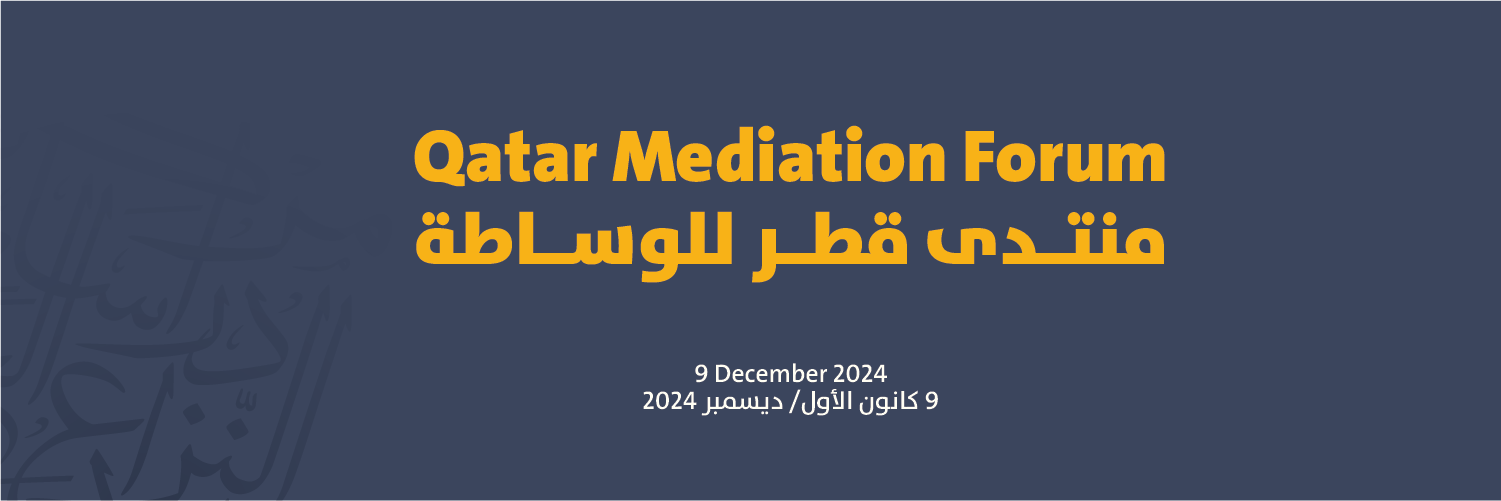
Changes in the global order have accelerated markedly over the past ten years and mediators face a growing series of challenges. Rising geopolitical tensions, competition over global norms, and increased fragmentation and conflict have been exacerbated by disagreement over economic principles and climate change, undermining consensus-based approaches to peace and other global public goods. There has been a notable decline in the number of global peace agreements, raising questions about the prospects of settling conflicts through negotiation, and the effectiveness of traditional mediation approaches.
This year, the Qatar Mediation Forum is organized in partnership with the Doha Forum. It will be held on December 9th, 2024, at the Sheraton Grand Hotel – Al Rayyan Hall, Doha, Qatar.
Objectives
In response to these evolving challenges, the Center for Conflict and Humanitarian Studies (CHS) has established the Qatar Mediation Forum to strengthen global mediation efforts. The Forum aims to:
Provide a discreet, conducive environment for leading mediators, diplomats, policy makers, and academics to explore the challenges facing mediators today, share perspectives, explore sensitive issues, and advance pragmatic approaches to conflict mediation in an evolving world order.
Inform the development and implementation of a Qatar Mediation Support Program to strengthen capacities for conflict mediation and humanitarian diplomacy in the Arab and Muslim world, training and preparing a new generation of mediators, increasing women's participation, and producing innovative approaches and tools to improve the reach and effectiveness of mediation efforts.
Through the Qatar Mediation Forum, the Center for Conflict and Humanitarian Studies advances its role as a leader in shaping innovative, sustainable approaches to conflict resolution and humanitarian diplomacy, addressing the pressing needs of an increasingly complex global landscape. The inaugural session will explore a range of pressing topics.
Today, there are more armed conflicts than at any time since World War II. ICRC estimates that there are over 120 conflicts currently underway, involving at least 60 states and 120 non-state armed groups. Most are fought within states, not between them, and the number of these non-international conflicts has tripled over the past 25 years. Many are characterized by a high number of belligerent parties who form coalitions and operate with varying degrees of political, economic, and military support from third-party actors, including other states.
Diversity in Mediation
The field of conflict mediation has benefited from the emergence of a growing cohort of new mediators, particularly at regional level as Middle Powers in the Gulf, Asia and Africa have become engaged in conflict management and regional stabilization initiatives. But this expansion creates challenges as well as opportunities, including effective cooperation between multiple mediators, managing conflicts of interest, resolving differences in normative frameworks and principles, and sustaining engagement to support the implementation of agreements.
Technological Innovation
Mediation is also evolving with the adoption of new digital technologies using big data, Geographic Information Systems, social media, and artificial intelligence to improve analysis and information sharing, enable more frequent and effective communication with mediation parties, advance inclusivity and expand outreach. Mediators are also confronting important challenges including harmful digital behavior designed to fuel tension and exacerbate divisions, and the emergence of new forms of information warfare increasingly fought in these digital spaces.
Women's Inclusion
Women mediators continue to face major obstacles almost a quarter of a century after UNSCR 1325 on Women, Peace and Security was adopted. Although women are at the forefront of conflict mediation in their communities, they continue to be marginalized in peace process negotiations and remain starkly underrepresented in senior-level mediation and negotiation roles: only 13 percent of negotiators and 6 percent of mediators in major peace processes are women.
Humanitarian Diplomacy – Interests over Values?
Humanitarian mediators must also contend with a sharp rise in geopolitical tensions over the past few years, the internationalization of civil conflict, and the declining effectiveness of international institutions as a result of the inconsistent application of international norms and standards. Years of erosion of the international rule of law, and the progressive integration of humanitarian assistance into states' political and security agendas have undermined respect for the principles of impartiality and independence, exacerbating the problems faced by mediators seeking to facilitate access, deliver critical aid and alleviate the suffering of people caught up in conflict.
Important Note:
Attending the Qatar Mediation Forum is by invitation only
Registration for Speakers and Participants will start at 8:00